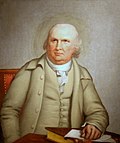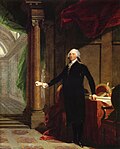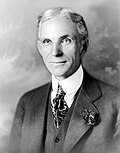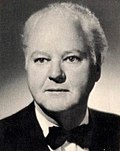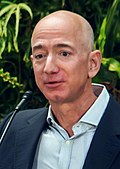List of richest Americans in history Last updated January 31, 2026
Business magnate and philanthropist John D. Rockefeller is sometimes considered the wealthiest American in history. Comparing wealth of individuals across large spans of time is difficult, as the value of money and assets is heavily dependent on the time period. There are various methods of comparing individuals' wealth across time, including using simple inflation-adjusted totals or calculating an individual's wealth as a share of contemporary gross domestic product (GDP). For this reason, there is not one decisive ranking of the richest Americans in history.
Fortune's wealthiest Americans (1957) $700,000,000 to $1,000,000,000 $400,000,000 to $700,000,000 $200,000,000 to $400,000,000 $100,000,000 to $200,000,000 $75,000,000 to $100,000,000 Klepper and Gunther (1996) American Heritage (1998) Bernstein and Swan (2008) Business Insider (2011) CNN Money (2014) By half decade References Many sources cite John D. Rockefeller (1839–1937) as the richest person in the history of the United States; however, this result comes not from adjusting his wealth for inflation, but by comparing his wealth to the size of the American economy at that time. [ 1] [ 2] [ 3] Since the economy was relatively small during his time period, his wealth represented a larger portion of the total economy. For example, economic blogger Scott Sumner noted in 2018 that Rockefeller was worth $1.4 billion when he died in 1937, equivalent to about $24 billion in dollars in 2018 when adjusting for inflation. Meanwhile, Bill Gates in 1999 was worth nearly $150 billion in dollars adjusted to 2018. [ 4]
"History of Jay Gould ," part of the set of 50 cigarette card -size booklets, Histories of Poor Boys Who Became Rich and Other Famous People , published by W. Duke, Sons & Co. in 1888. The set also included, among others, booklets on Andrew Carnegie, John J. Astor, and Cornelius Vanderbilt. The second-richest person in terms of wealth compared to contemporary GDP is a subject of dispute. While most sources attribute this status to Andrew Carnegie , others argue that it could be Bill Gates , Cornelius Vanderbilt I , John Jacob Astor IV , or Henry Ford . Determining the lower ranks is an even more contentious debate. Vanderbilt left a fortune worth $100 million upon his death in 1877, equivalent to $2.4 billion today. [ 5] As the United States became the world's leading economic power by the late 19th century, the wealthiest people in the country were often also the wealthiest people in the world.
In 1957, Fortune magazine developed a list of the seventy-six wealthiest Americans , which was published in many American newspapers. [ 6] Jean Paul Getty , when asked his reaction to being named wealthiest American and whether he was worth a billion dollars, said, "You know, if you can count your money, you don't have a billion dollars" and then added, "But remember, a billion dollars isn't worth what it used to be." [ 7]
The second category, the second to eighth richest individuals, included Andrew Mellon 's son, daughter, niece, and nephew. Wealthiest Americans included a total of seven members of the Rockefeller family , five members of the Ford family , four members of the Du Pont family (and a non-family DuPont executive), and four General Motors executives.
Ailsa Mellon Bruce , New York, New York ; inherited wealth: Gulf Oil Company , Alcoa . Arthur Vining Davis , Pittsburgh, Pennsylvania ; Alcoa , Florida real estate. H. L. Hunt , Dallas, Texas ; independent oil operator. Paul Mellon , Upperville, Virginia ; inherited wealth. Richard King Mellon , Pittsburgh, Pennsylvania ; inherited wealth: Alcoa, Gulf Oil, Mellon Bank, etc. John D. Rockefeller Jr. , New York ; money earned: Standard Oil Trust . Sarah Mellon , Pittsburgh; inherited wealth. Irénée du Pont , Wilmington, Delaware and Cuba ; inherited wealth: E. I du Pont de Nemours & Co. William du Pont Jr. , Wilmington; inherited wealth: E. I du Pont de Nemours & Co. Mrs. Frederick Guest , the former Amy Phipps, Palm Beach, Florida ; inherited wealth from father Henry Phipps Jr. , a Carnegie Steel executive. Howard Hughes , Los Angeles; inherited wealth: Hughes Tool Company . Joseph P. Kennedy , Boston, Massachusetts and New York; real estate. Daniel K. Ludwig , New York; National Bulk Carriers . Sid Richardson , Fort Worth, Texas ; independent Oil operator. Alfred P. Sloan, Jr. , New York; General Motors Corporation . James Abercrombie , Houston, Texas ; independent oil operator. Vincent Astor , New York; inherited wealth: real estate. Stephen Bechtel , San Francisco; construction, Bechtel Corporation . William Blakley , Dallas; Braniff Airways , real estate. Jacob Blaustein , Baltimore, Maryland ; American Oil Company . Lammot du Pont Copeland , Wilmington; E. I du Pont de Nemours & Co. Clarence Dillon , New York; Dillon, Read & Co. Doris Duke , New York and New Jersey; inherited wealth: tobacco. Mrs. Alfred I. du Pont , Jacksonville, Florida and Wilmington; inherited wealth: St. Joe Paper Company , E. I du Pont de Nemours & Co. Mr. Edsel Ford , Detroit, Michigan; inherited wealth: Ford Motor Company . Amory Houghton , Ambassador to France; inherited wealth: Corning Glass . Arthur A. Houghton Jr. , New York; Corning Glass. Roy Arthur Hunt , Pittsburgh; Alcoa. William Keck , Los Angeles; Superior Oil. Charles F. Kettering , Dayton, Ohio ; General Motors Corporation. Mrs. Jean Mauzé , the former Abby Rockefeller, New York; inherited wealth: Standard Oil Trust. Mrs. Chauncey McCormick , the former Marion Deering , Chicago, Illinois ; inherited wealth. William L. McKnight , St. Paul, Minnesota ; Minnesota Mining & Manufacturing . John W. Mecom Sr. , Houston; independent oil operator. Clint Murchison , Dallas; independent oil operator. Mrs. Charles Payson , the former Joan Whitney, New York; inherited wealth. John L. Pratt , Fredericksburg, Virginia ; General Motors Corporation. David Rockefeller , New York; Chase Manhattan Bank and inherited wealth: Standard Oil Trust. John D. Rockefeller 3rd , New York; inherited wealth: Standard Oil Trust. Laurance Rockefeller , New York; venture capital: Eastern Air Lines , Reaction Motors , International Nickel and inherited wealth: Standard Oil Trust. Nelson Rockefeller , New York; Rockefeller Center,-, Inc. , International Basic Economy Corporation and inherited wealth: Standard Oil Trust. Winthrop Rockefeller , Arkansas ; ranching, Ibec Housing and inherited wealth: Standard Oil Trust. R. E. Smith , Houston; independent oil operator. John Hay Whitney , New York, Ambassador to Britain; venture capital and inherited wealth. Michael Late Benedum , Pittsburgh and West Virginia; Benedum-Trees Oil Company , Hiawatha Oil and Gas , etc. Donaldson Brown , Port Deposit, Maryland ; E. I du Pont de Nemours & Co. George R. Brown , Houston; Brown & Root, Inc. Herman Brown , Houston; Brown & Root, Inc. John Nicholas Brown I , Newport, Rhode Island ; inherited wealth: real estate. Godfrey L. Cabot , Boston; Godfrey L. Cabot, Inc. , etc. James A. Chapman , Tulsa, Oklahoma ; inherited: wealth: oil. Leo Corrigan , Dallas; real estate. Mrs. Horace Dodge, Jr. , Palm Beach and Detroit; inherited wealth: automobiles. John T. Dorrance, Jr. , Philadelphia, Pennsylvania ; inherited wealth: Campbell Soup Company . Benson Ford , Detroit; inherited wealth: Ford Motor Company. Henry Ford II , Detroit; inherited wealth: Ford Motor Company. William C. Ford , Detroit; inherited wealth: Ford Motor Company. Erle P. Halliburton , Duncan, Oklahoma ; Halliburton Oil Well Cementing Company (died in Los Angeles Oct. 13, 1957). Averell Harriman , Albany, New York, Governor of New York; inherited wealth: investment banking. Henry J. Kaiser , Oakland, California ; Kaiser Industries , etc. John W. Kieckhefer , Milwaukee, Wisconsin and Prescott, Arizona ; Kieckhefer Container, Eddy Paper (absorbed by Weyerhaeuser ). Robert J. Kleberg Jr. , King Ranch, Texas ; inherited wealth: cattle, oil, land. John E. Mabee , Tulsa; independent oil operator. John D. MacArthur , Chicago; Bankers Life and Casualty Company . A. H. Meadows , Dallas; General American Oil. Charles S. Mott , Flint, Michigan ; General Motors Corporation. John M. Olin , Alton, Illinois ; inherited wealth: Olin Mathieson Chemical . Spencer T. Olin , Alton, Ill.; inherited wealth: Olin Mathieson Chemical. J. Howard Pew , Philadelphia; inherited wealth: Sun Oil Company . Joseph Pew , Philadelphia; inherited wealth: Sun Oil. Marjorie Merriweather Post , Washington, DC ; inherited wealth: General Foods . James Sottile Jr. , Miami; Pan American Bank. George W. Strake , Houston; inherited wealth: independent oil operator. Louis Wolfson , Miami Beach, Florida ; Merritt-Chapman & Scott , New York Shipbuilding , etc. Robert Woodruff , Atlanta, Georgia ; The Coca-Cola Company . American Heritage (1998) American Heritage magazine [ 10] The list was compiled by taking each person's wealth at death, adding the amount given away during his lifetime, and expressing the total as a fraction of the nation's GDP at the time.
Bernstein and Swan in All the Money in the World (2008) mention the 15 richest Americans in history. [ 11]
The following is a list compiled by CNN Money in 2014. [ 13]
By half decade This list names the richest American by half decade starting in 1770. [ 14]
References ↑ "The All-Time Richest Americans" . Forbes . September 14, 2007. ↑ All the Money in the World (2008) by Bernstein and Swan , p. 17 "Introduction" ↑ "CPI Inflation Calculator" . United States Bureau of Labor Statistics. Retrieved December 15, 2022 . ↑ Sumner, Scott (February 24, 2018). "Virtually all sources are wrong" . The Money Illusion . Retrieved February 27, 2018 . ↑ 1634–1699: McCusker, J. J. (1997). How Much Is That in Real Money? A Historical Price Index for Use as a Deflator of Money Values in the Economy of the United States: Addenda et Corrigenda (PDF) . American Antiquarian Society . McCusker, J. J. (1992). How Much Is That in Real Money? A Historical Price Index for Use as a Deflator of Money Values in the Economy of the United States (PDF) . American Antiquarian Society . Federal Reserve Bank of Minneapolis. "Consumer Price Index (estimate) 1800–" . Retrieved February 29, 2024 . ↑ "Richest People in America (1957) - LittleSis" . littlesis.org . Retrieved June 18, 2024 . ↑ "J. Paul Getty Dead at 83; Amassed Billions From Oil" . The New York Times . June 6, 1976. Retrieved April 22, 2013 . ↑ "The Wealthiest Americans Ever" . The New York Times . July 15, 2007. ↑ Klepper, Michael M.; Gunther, Robert E. (1996). The Wealthy 100: From Benjamin Franklin to Bill Gates-- a Ranking of the Richest Americans, Past and Present ISBN 978-0-8065-1800-8 ↑ Gibson, Christine (October 1998). "The American Heritage" . American Heritage . Vol. 49, no. 6. ↑ All the Money in the World (2008) by Bernstein and Swan , p. 17 "Introduction" ↑ Gus Lubin (April 17, 2011). "The 13 Richest Americans of All Time" . Business Insider . ↑ Hargreaves, Steve (June 1, 2014). "The richest Americans in history" . CNNMoney . Retrieved March 5, 2018 . ↑ Klepper, Michael; Gunther, Michael (1996), The Wealthy 100: From Benjamin Franklin to Bill Gates – A Ranking of the Richest Americans, Past and Present Secaucus, New Jersey : Carol Publishing Group, p. xii , ISBN 978-0-8065-1800-8 OCLC 33818143 ↑ Heitzler, Michael James (2005). Goose Creek, South Carolina: A Definitive History 1670–2003 1. Charleston, SC: The History Press. p. 86. ISBN 978-1-59629-055-6 ↑ Kennedy, John (1894). Robert Morris and the Holland Purchase 121 . richest man 1775 robert morris. ↑ Spingola, Deanna (2011). The Ruling Elite: a Study in Imperialism, Genocide and Emancipation 48. ISBN 978-1-4269-5462-7 ↑ Gross, Daniel (April 1, 2002). "Finance & Investment: Cash of the Titans" . Robb Report . Malibu, CA. ↑ Kellogg, Day Otis (1898). New American Supplement to the Latest Edition of the Encyclopædia Britannica 2. New York, NY: The Werner Company. p. 1031. ↑ Burke, James (2007). American Connections: The Founding Fathers. Networked . New York, NY: Simon & Schuster. pp. 157 –58. ISBN 978-0-7432-8226-0 richest man america 1800. ↑ Phillips, Kevin (June 18, 2002). Wealth and Democracy: A Political History of America's Rich . New York, NY: Broadway Books. p. Chapter 1. ISBN 9780767911511 richest man united states 1810. ↑ Jones, Abner Dumont (1854). The Illustrated American Biography 2. New York, NY: J. Milton Emerson & Co. p. 463. ↑ Scharrenberg, Paul, ed. (February 1, 1929). "The Slow Climb of Wages" . The Seamen's Journal . San Francisco, CA: International Seamen's Union of America. p. 48 – via Google Books . ↑ Pinheiro, John C. (October 4, 2016). "James K. Polk: The American Franchise" . U.S. Presidents: James K. Polk . Charlottesville, VA: University of Virginia: The Miller Center. Retrieved June 13, 2021 . ↑ Buder, Stanley (2009). Capitalizing on Change: A Social History of American Business 105. ISBN 978-0-8078-3231-8 Cornelius Vanderbilt (1794–1877) succeeded Astor as the wealthiest American. ↑ Kemp, Michael (2016). Uncommon Sense: Investment Wisdom Since the Stock Market's Dawn 242. ISBN 978-0-7303-2424-9 Consider also Cornelius Vanderbilt, the wealthiest American at the time of his death in 1877. ↑ Davies, Norman (2018). Beneath Another Sky: A Global Journey into History 534. ISBN 978-1-8461-4831-6 – via Google Books . ↑ Li, Xiaobing; Molina, Michael (2014). Oil: A Cultural and Geographic Encyclopedia of Black Gold 1. Santa Barbara, CA: ABC-CLIO. p. 335. ISBN 978-1-61069-271-7 ↑ "America's Richest Man: J. D. Rockefeller and his Enormous Fortune" . The Star . Canterbury, NZ. Detroit Free Press. April 6, 1895. ↑ National Republic: A Monthly Review of American History, Policy, Politics and Public Affairs 30. The richest man in America is Henry Ford. ↑ Knowles, Ruth Sheldon (1978). The Greatest Gamblers: The Epic of American Oil Exploration 302. ISBN 978-0-8061-1513-9 ↑ Fontevecchia, Agustino (April 23, 2015). "The Getty Family: A Cautionary Tale of Oil, Adultery, And Death" . Forbes.com . Jersey City. Retrieved February 17, 2025 . ↑ Swindoll, Charles R. (2005). Living on the Ragged Edge Workbook: Finding Joy in a World Gone Mad 95. ISBN 978-1-4185-5938-0 – via Google Books . ↑ Berglund, Nina (August 15, 1980). "Billionaire Buys Catalina Savings" . Tucson Citizen . Tucson, AZ. pp. 1A, 3A – via Newspapers.com . ↑ "America's richest man is one of the boys" . UPI Archives . Washington, DC. United Press International . November 10, 1985. Retrieved June 13, 2022 . ↑ Miller, Stephen (September 9, 2010). "A One-Man Empire, From TV to Laundry" . The Wall Street Journal . ↑ "Forbes magazine profile on Bill Gates" . Forbes. 2015. Retrieved May 1, 2015 . ↑ "Jeff Bezos Becomes the Richest Man in Modern History, Topping $150 Billion" . Bloomberg. July 16, 2018. Retrieved May 10, 2020 . ↑ Picchi, Aimee (December 11, 2024). Lee, Anne Marie (ed.). "Elon Musk's net worth tops $400 billion, a first for any person" . CBS News . New York.
By citizenship By region Forbes listsLists Other
This page is based on this
Wikipedia article Text is available under the
CC BY-SA 4.0 license; additional terms may apply.
Images, videos and audio are available under their respective licenses.



